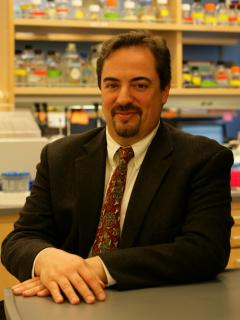
Dr. Ari Melnick, the Gebroe Family Professor of Hematology/Oncology, Division of Hematology and Medical Oncology, and colleagues have published critical findings on non-Hodgkin Lymphoma in Cancer Cell. Diffuse large B cell lymphomas (DLBCLs), which account for approximately one third of all non-Hodgkin lymphomas, were found to be addicted to an enzyme called SIRT3. It was discovered that this enzyme turbo-charges a metabolic process that supports the rapid growth of DLBCLs. In response to this finding, Dr. Melnick and team went on to develop an SIRT3-blocking compound that rapidly kills DLBCL cells in the culture dish and in mice.
It has been known that DLBCL cells carry differing sets of cancer-driving gene mutations. The team uncovered that the over-activity of SIRT3 in DLBCL is a core feature that occurs across all sets of gene mutation (genetic subtypes). Using the current treatments for DLBCL, about 40% of patients fail to respond or they relapse. Treatments for DLBCL have been challenging due to the differing sets of gene mutation. Dr. Melnick explains that the SIRT3-inhibtor approach has the potential to benefit many non-Hodgkin lymphoma patients “because it targets a feature of these lymphomas that is independent of their genetics.” This finding has been especially illuminating, as SIRT3 had generally been considered a tumor suppressor, not a tumor-driver.
In developing chemical compounds to inhibit SIRT3 activity, Dr. Melnick worked with Dr. Hening Lin, a Professor of Chemistry at Cornell University and co-senior author on the Cancer Cell publication. During this phase of the research, a compound was found (YC8-02) that showed no evident toxicity. The scientists also found that SIRT3 is not a critical element for normal functioning in noncancerous B cells. Thus, altogether, the path looks promising towards an SIRT3 inhibitor drug that would be relatively free of side effects.

